Nikos Mamoulis
Leveraging Meta-path Contexts for Classification in Heterogeneous Information Networks
Dec 18, 2020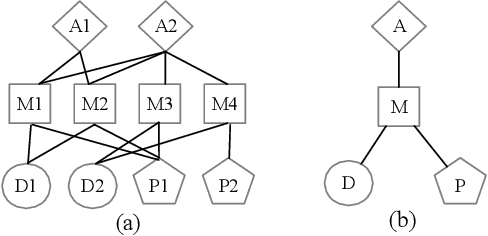
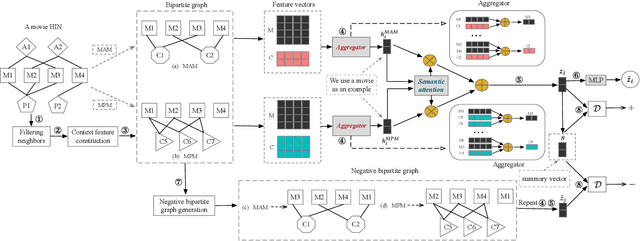
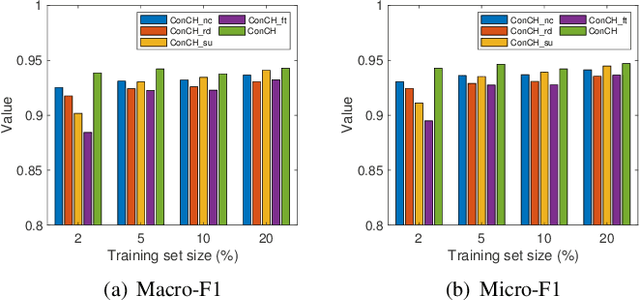
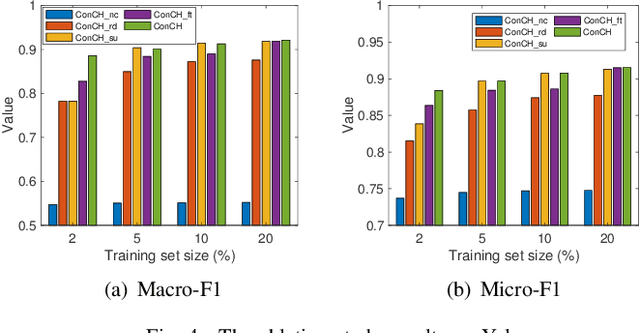
Abstract:A heterogeneous information network (HIN) has as vertices objects of different types and as edges the relations between objects, which are also of various types. We study the problem of classifying objects in HINs. Most existing methods perform poorly when given scarce labeled objects as training sets, and methods that improve classification accuracy under such scenarios are often computationally expensive. To address these problems, we propose ConCH, a graph neural network model. ConCH formulates the classification problem as a multi-task learning problem that combines semi-supervised learning with self-supervised learning to learn from both labeled and unlabeled data. ConCH employs meta-paths, which are sequences of object types that capture semantic relationships between objects. Based on meta-paths, it considers two sources of information for an object x: (1) Meta-path-based neighbors of x are retrieved and ranked, and the top-k neighbors are retained. (2) The meta-path instances of x to its selected neighbors are used to derive meta-path-based contexts. ConCH utilizes the above information to co-derive object embeddings and context embeddings via graph convolution. It also uses the attention mechanism to fuse the embeddings of x generated from various meta-paths to obtain x's final embedding. We conduct extensive experiments to evaluate the performance of ConCH against other 14 classification methods. Our results show that ConCH is an effective and efficient method for HIN classification.
Fast and Secure Distributed Nonnegative Matrix Factorization
Sep 07, 2020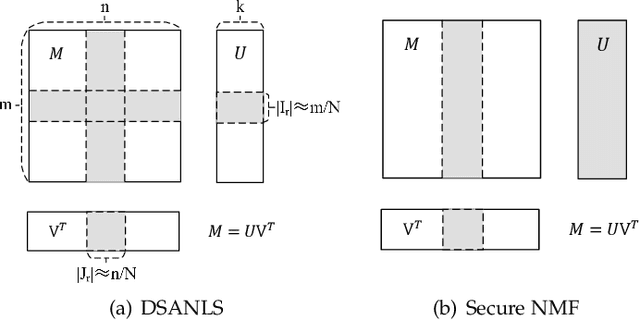

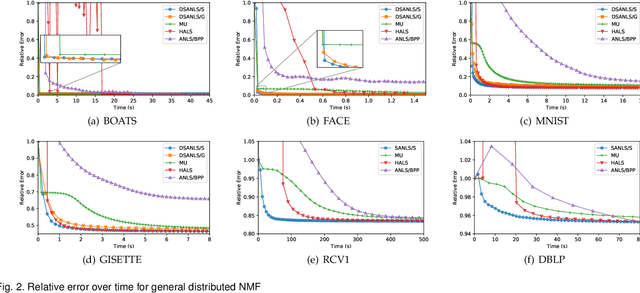

Abstract:Nonnegative matrix factorization (NMF) has been successfully applied in several data mining tasks. Recently, there is an increasing interest in the acceleration of NMF, due to its high cost on large matrices. On the other hand, the privacy issue of NMF over federated data is worthy of attention, since NMF is prevalently applied in image and text analysis which may involve leveraging privacy data (e.g, medical image and record) across several parties (e.g., hospitals). In this paper, we study the acceleration and security problems of distributed NMF. Firstly, we propose a distributed sketched alternating nonnegative least squares (DSANLS) framework for NMF, which utilizes a matrix sketching technique to reduce the size of nonnegative least squares subproblems with a convergence guarantee. For the second problem, we show that DSANLS with modification can be adapted to the security setting, but only for one or limited iterations. Consequently, we propose four efficient distributed NMF methods in both synchronous and asynchronous settings with a security guarantee. We conduct extensive experiments on several real datasets to show the superiority of our proposed methods. The implementation of our methods is available at https://github.com/qianyuqiu79/DSANLS.
A General Early-Stopping Module for Crowdsourced Ranking
Nov 04, 2019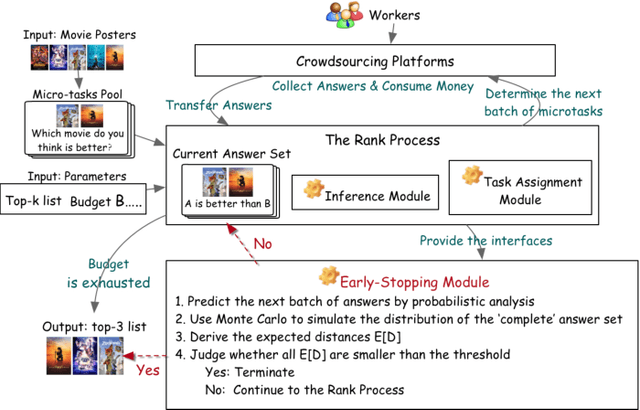


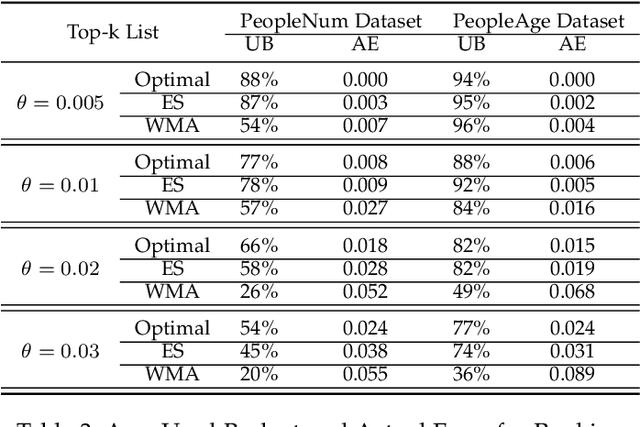
Abstract:Crowdsourcing can be used to determine a total order for an object set (e.g., the top-10 NBA players) based on crowd opinions. This ranking problem is often decomposed into a set of microtasks (e.g., pairwise comparisons). These microtasks are passed to a large number of workers and their answers are aggregated to infer the ranking. The number of microtasks depends on the budget allocated for the problem. Intuitively, the higher the number of microtask answers, the more accurate the ranking becomes. However, it is often hard to decide the budget required for an accurate ranking. We study how a ranking process can be terminated early, and yet achieve a high-quality ranking and great savings in the budget. We use statistical tools to estimate the quality of the ranking result at any stage of the crowdsourcing process and terminate the process as soon as the desired quality is achieved. Our proposed early-stopping module can be seamlessly integrated with most existing inference algorithms and task assignment methods. We conduct extensive experiments and show that our early-stopping module is better than other existing general stopping criteria. We also implement a prototype system to demonstrate the usability and effectiveness of our approach in practice.
An End-to-End Deep RL Framework for Task Arrangement in Crowdsourcing Platforms
Nov 04, 2019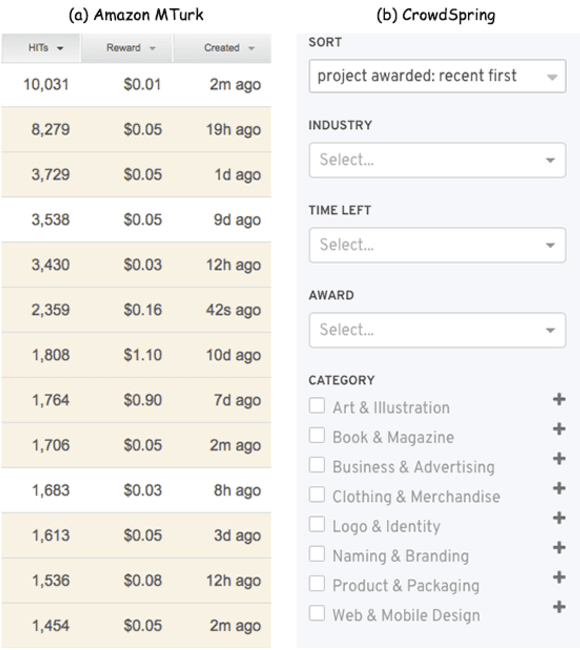

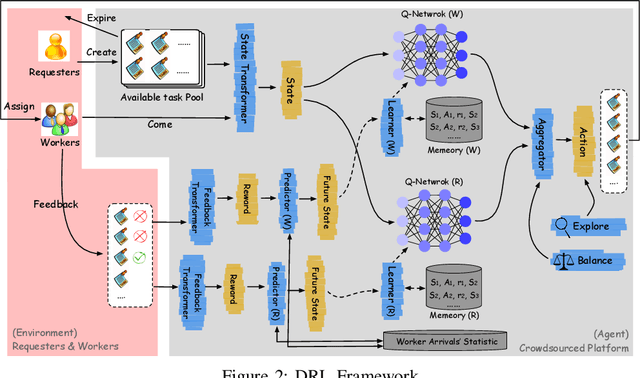

Abstract:In this paper, we propose a Deep Reinforcement Learning (RL) framework for task arrangement, which is a critical problem for the success of crowdsourcing platforms. Previous works conduct the personalized recommendation of tasks to workers via supervised learning methods. However, the majority of them only consider the benefit of either workers or requesters independently. In addition, they cannot handle the dynamic environment and may produce sub-optimal results. To address these issues, we utilize Deep Q-Network (DQN), an RL-based method combined with a neural network to estimate the expected long-term return of recommending a task. DQN inherently considers the immediate and future reward simultaneously and can be updated in real-time to deal with evolving data and dynamic changes. Furthermore, we design two DQNs that capture the benefit of both workers and requesters and maximize the profit of the platform. To learn value functions in DQN effectively, we also propose novel state representations, carefully design the computation of Q values, and predict transition probabilities and future states. Experiments on synthetic and real datasets demonstrate the superior performance of our framework.
Heterogeneous Information Network Embedding for Meta Path based Proximity
Jan 19, 2017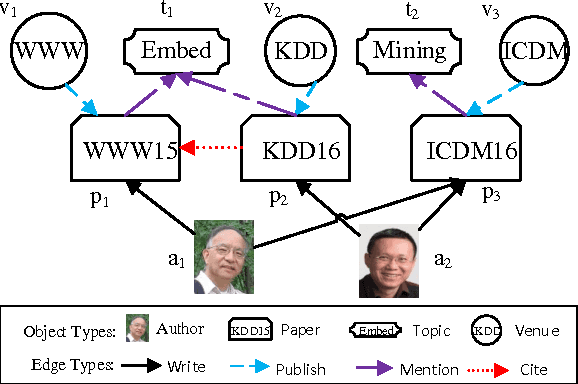

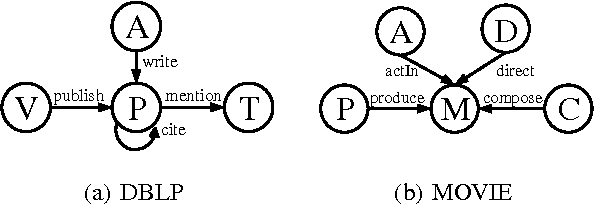

Abstract:A network embedding is a representation of a large graph in a low-dimensional space, where vertices are modeled as vectors. The objective of a good embedding is to preserve the proximity between vertices in the original graph. This way, typical search and mining methods can be applied in the embedded space with the help of off-the-shelf multidimensional indexing approaches. Existing network embedding techniques focus on homogeneous networks, where all vertices are considered to belong to a single class.
 Add to Chrome
Add to Chrome Add to Firefox
Add to Firefox Add to Edge
Add to Edge